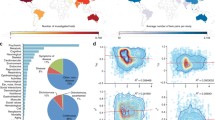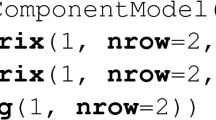Abstract
Parameter estimates from the DeFries and Fulker [(DF)Behav. Genet. 15:462–473, 1985] regression method can be greater than unity or less than zero. This occurs when the monozygotic correlation is greater than twice the dizygotic correlation. Sensible values can be obtained in these cases by fitting a constrained DF model that estimates genetic and nonshared environmental variance components only. In this article I demonstrate that the original Df model yields positively biased heritability estimates and negatively biased estimates of shared environmentality when data are significantly influenced by genetic nonadditivity. The magnitude of the bias is algebraically expressed. I then describe a simple regression equation that provides unbiased estimates of the standardized additive and dominance genetic variance components. Results of a study of 6 million twin pairs from the Monte Carlo Twin Registry demonstrate that the DF additive and dominance genetic parameter estimates are virtually identical to those obtained by maximum-likelihood procedures. Finally, I derive the expectations for the constrained DF model and show that the genetic parameter estimates from this model are negatively biased estimates of broad-sense heritability.
Similar content being viewed by others
References
APTECH (1993).GAUSS User's Manual, APTECH Systems Inc., Kent, WA.
Cherny, S. S., Cardon, L. R., Fulker, D. W., and DeFries, J. C. (1992a). Differential heritability across levels of cognitive ability.Behav. Genet. 22:153–162.
Cherny, S. S., DeFries, J. C., and Fulker, D. W. (1992b). Multiple regression analysis of twin data: A model-fitting approach.Behav. Genet. 22:489–497.
Cyphers, L. H., Phillips, K., Fulker, D. W., and Mrazek, D. A. (1990). Twin temperament during the transition from infancy to early childhood.Am. Acad. Child Adolesc. Psychiat. 29:392–397.
DeFries, J. C., and Fulker, D. W. (1985). Multiple regression analysis of twin data.Behav. Genet. 15:462–473.
Detterman, D. K., Thompson, L. A., and Plomin, R. (1990). Differences in heritability across groups differing in ability.Behav. Genet. 20:369–384.
Falconer, D. S. (1960).Introduction to Quantitative Genetics, Longman Scientific & Technical, Essex, England.
Heath, A. C., Neale, M. C., Hewitt, J. K., Eaves, L. J., and Fulker, D. W. (1989). Testing structure equation models for twin data using LISREL.Behav. Genet. 19:9–36.
LaBuda, M. C., DeFries, J. C., and Fulker, D. W. (1986). Multiple regression analysis of twin data obtained from selected samples.Genet. Epidemiol. 3:425–433.
Lykken, D. T., McGue, M., and Tellegen, A. (1987). Recruitment bias in twin research: The rule of two-thirds reconsidered.Behav. Genet. 17:343–362.
Lykken, D. T., McGue, M., Tellegen, A., and Bouchard, T. J., Jr. (1992). Emergenesis: Genetic traits that may not run in families.Am. Psychol. 47:1565–1577.
Martin, N. G., Eaves, L. J., Kearsey, M. J., and Davies, P. (1978). The power of the classical twin study.Heredity 40:97–116.
Neale, M. C., and Cardon, L. R. (1992).Methodology for Genetic Studies of Twins and Families, Kluwer Academic, Dordrecht, The Netherlands.
Rose, R. J. (1988). Genetic and environmental variance in content dimensions of the MMPI.J. Personal. Soc. Psychol. 55:302–311.
Waldman, I. D., DeFries, J. C., and Fulker, D. W. (1992). Quantitative genetic analysis if IQ development in young children: Multivariate multiple regression with orthogonal polynomials.Behav. Genet. 22:229–238.
Author information
Authors and Affiliations
Rights and permissions
About this article
Cite this article
Waller, N.G. A DeFries and Fulker regression model for genetic nonadditivity. Behav Genet 24, 149–153 (1994). https://doi.org/10.1007/BF01067818
Received:
Accepted:
Issue Date:
DOI: https://doi.org/10.1007/BF01067818




